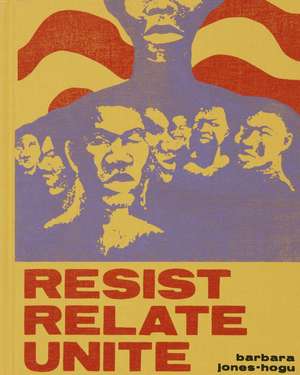Barbara Jones-Hogu: Resist, Relate, Unite
Autor Julie Rodrigues Widholm, Faheem Majeed, Zoé Whitley, Rebecca Zorachen Limba Engleză Hardback – 15 oct 2018
Chicago-based artist Barbara Jones-Hogu (1938–2017) was a central figure of the Black Arts Movement and a founding member of the African Commune of Bad Relevant Artists (AfriCOBRA). Throughout her career she worked in painting, printmaking, film, education, and contributed to major projects including Chicago’s Wall of Respect mural. The Barbara Jones-Hogu: Resist, Relate, Unite catalog is the first monograph of Barbara Jones-Hogu’s work. The book includes a foreword by DPAM Director and Chief Curator Julie Rodrigues Widholm, essays by Tate Modern curator Zoé Whitley and Chicago artist Faheem Majeed, an interview with the artist by art historian Rebecca Zorach, and 22 illustrated plates, a selected bibliography, exhibition history, and checklist. The limited edition catalog was designed by Matt Austin of Candor Arts and features a hand silk screened cover.
Preț: 306.61 lei
Preț vechi: 351.55 lei
-13% Nou
Puncte Express: 460
Preț estimativ în valută:
58.67€ • 61.42$ • 48.55£
58.67€ • 61.42$ • 48.55£
Carte indisponibilă temporar
Doresc să fiu notificat când acest titlu va fi disponibil:
Se trimite...
Preluare comenzi: 021 569.72.76
Specificații
ISBN-13: 9780985096076
ISBN-10: 0985096071
Pagini: 104
Ilustrații: Illustrated in color throughout
Dimensiuni: 197 x 254 x 18 mm
Greutate: 0.68 kg
Ediția:First Edition
Editura: DePaul Art Museum
Colecția DePaul Art Museum
ISBN-10: 0985096071
Pagini: 104
Ilustrații: Illustrated in color throughout
Dimensiuni: 197 x 254 x 18 mm
Greutate: 0.68 kg
Ediția:First Edition
Editura: DePaul Art Museum
Colecția DePaul Art Museum
Recenzii
"Barbara Jones-Hogu: Resist, Relate, Unite is well organized, providing critical analysis of what it meant to be a Black visual artist during the 1960s and 1970s. Students of the Black Power or Black Arts Movements will find Jones-Hogu’s detailed descriptions of her experiences and honest reflections to be valuable. . . . It is a valuable addition to the annals of art history and can offer technical clues to printmakers, but should not be classified only as art history. Historians—in particular those who study general African American history and Black nationalism—and community archivists will appreciate the narrative."
